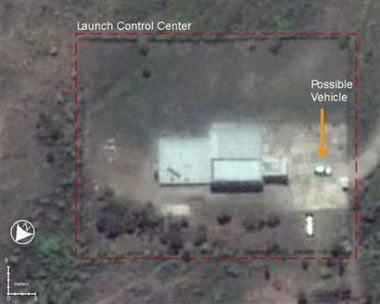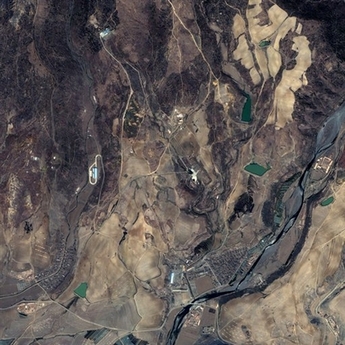North Korea said Wednesday it wants direct talks with the United States over
its apparent plans to test-fire a long-range missile, a day after the country
issued a statement in which it declared its right to carry out the launch.

A
commercial satellite photo of North Korea's Nodong missile launch site
taken on by a Digital Globe satellite and annotated and released by
analysts at GlobalSecurity.org on May 24, 2006. The United States and
Japan warned North Korea on Monday against a missile launch that experts
say could reach as far as Alaska and threatened harsh action if the test
flight goes ahead. [Reuters] |
Tensions in the region have soared following intelligence reports that the
North was fueling a ballistic missile believed capable of reaching US territory.
The United States and Japan have said they could consider sanctions against
the country and push the UN Security Council for retaliatory action should
the launch go ahead.
North Korea said in comments published Wednesday that its self-imposed
moratorium on testing long-range missiles from 1999 no longer applies because
it's not in direct dialogue with Washington, suggesting it would hold off on any
launch if the US agreed to new talks.
"Some say our missile test launch is a violation of the moratorium, but this
is not the case," Han Song Ryol, deputy chief of North Korea's mission to the
United Nations, told South Korea's Yonhap news agency in an interview from New
York.
"North Korea as a sovereign state has the right to develop, deploy, test fire
and export a missile," he said. "We are aware of the US concerns about our
missile test-launch. So our position is that we should resolve the issue through
negotiations."
The North's official Korean Central News Agency also ran a report Wednesday
on US officials urging direct talks between Washington and Pyongyang in regard
to the standoff over the North's nuclear weapons program.
Pyongyang has consistently pressed for direct dialogue with the United
States, while Washington insists it will only speak to the North at six-nation
nuclear talks. The North has refused to return to those nuclear talks since
November because of a US crackdown on the country's alleged illicit financial
activity.
The new statement from the North came after France and the UN
secretary-general raised the alarm over what are believed to be the North's
preparations for a test of the Taepodong-2, with a range of up to 9,300 miles.
Japan and South Korea also pledged to cooperate to stop Pyongyang's apparent
plans for a launch.
On Tuesday, North Korea asserted its right to test-fire missiles in a
statement to Japanese reporters in Pyongyang.
"This issue concerns our autonomy. Nobody has a right to slander that right,"
the Kyodo News agency quoted North Korean Foreign Ministry official Ri Pyong Dok
as saying.
Kyodo also quoted Ri as saying the North is not bound by the joint
declaration at international nuclear disarmament talks last year or a missile
moratorium agreed to by Tokyo and Pyongyang in 2002. North Korean leader Kim
Jong Il reaffirmed the moratorium, in place in practice since 1999, in 2004.
Ri told reporters his remarks represented Pyongyang's official line on the
matter, but refused to comment on whether the North would push ahead with the
missile test, saying it was inappropriate for a diplomat to give further
information, Kyodo said.
A pro-North Korean newspaper in Japan, Choson Sinbo, said Wednesday the
launch of could take place "anytime, which can be in a month or in a year." Over
the weekend, Kyodo reported that North Korea plans to disguise the missile test
as an attempt to put a satellite into orbit, as it did with the 1998 missile
launch.
The international campaign to block the launch widened Tuesday, with the
French government and UN Secretary-General Kofi Annan calling for a halt to test
preparations.
"I hope that the leaders of North Korea will listen to and hear what the
world is saying. We are all worried," said Annan, who was in Paris. He called
for all parties in the standoff to avoid an escalation of tensions.

In this satellite
image released by GeoEye, the Taepodong missile launch complex in North
Korea, called Musudan-ri, is shown in 2001. North Korea said Sunday, June
18, 2006, it is seeking to increase its military deterrent to cope with US
moves in a restatement of its typical anti-Washington propaganda, amid
increasing signs that the country is preparing for a missile test.
[AP] |
French Prime Minister Dominique de Villepin, speaking after talks with Annan,
said any North Korean missile test must draw a "firm and just" international
response.
China also urged calm.
"We hope that under the current circumstances, relevant parties can do more
in the interest of regional stability and peace," said Foreign Ministry
spokeswoman Jiang Yu.
Information on the test preparation remained scant and contradictory Tuesday.
Especially unclear is whether Pyongyang has completed injecting fuel into the
missile, a move some experts consider irreversible and a clear sign the country
intends to launch.
Japan's public broadcaster NHK reported that US satellite images suggest the
North was still fueling its missile. And a US official in Washington, speaking
on condition of anonymity, said Monday that US intelligence indicated North
Korea had finished fueling.
However, Japan's Deputy Chief Cabinet Secretary Jinen Nagase said Japan could
not confirm that fueling was complete. And South Korea's spy agency, the
National Intelligence Service, believes North Korea hasn't finished because the
40 tanks seen around a launch site weren't enough to fuel a 65 ton missile,
Yonhap news agency reported.
South Korean Foreign Minister Ban Ki-moon said it appeared some rockets had
been assembled, but the North's intentions were unclear. There were no reports
of a launch by Tuesday evening, and the North is considered unlikely to launch
at nighttime.
Ban agreed in a phone conversation with his Japanese counterpart, Taro Aso,
to cooperate to prevent a North Korean launch, Japan's Foreign Ministry said
Tuesday.
Amid the rising tensions, the United States staged war games near Guam in the
western Pacific with 22,000 troops and three aircraft carriers. Commanders said
the maneuvers were not aimed at any particular country.
The test fears have been especially high in Japan, a firm US ally with no
diplomatic relations with Pyongyang. The two countries are at odds over the
North's abduction of Japanese citizens, Pyongyang's nuclear weapons development
and wartime grievances.
Washington also kept up the pressure on Pyongyang. The US ambassador to South
Korea conveyed the Bush administration's concerns to former South Korean
President Kim Dae-jung, who was to meet North Korean leader Kim Jong Il next
week, but postponed his trip to the North on Wednesday. The "trip has become
difficult," said his aide, Jeong Se-hyun.